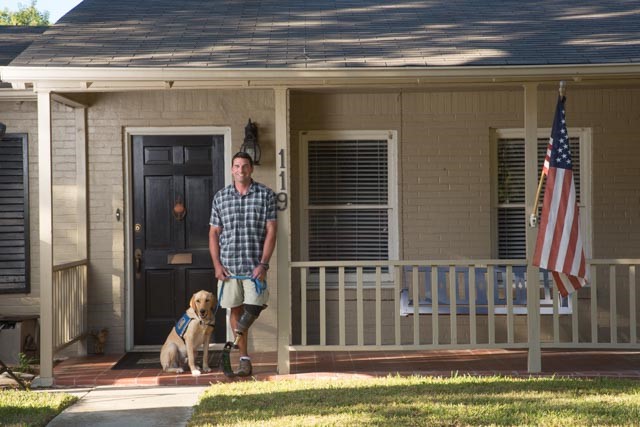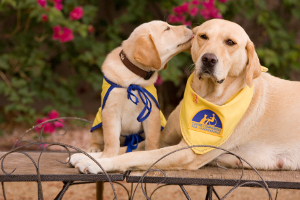Canine Companions for Independence at Baylor Scott and White Health – Kinkeade Campus
Baylor Scott & White Health has affiliated with Canine Companions for Independence, a leader in the development of assistance dogs, to bring a premier service animal training center to Texas.
Exceptional Dogs for Exceptional People®
 In December 2014, we broke ground on the new Canine Companions for Independence at Baylor Scott & White Health – Kinkeade Campus. The Kinkeade campus is adjacent to the Baylor Surgical Hospital at Las Colinas and will be used to train assistance dogs for placement, free of charge, for people with a broad range of disabilities.
In December 2014, we broke ground on the new Canine Companions for Independence at Baylor Scott & White Health – Kinkeade Campus. The Kinkeade campus is adjacent to the Baylor Surgical Hospital at Las Colinas and will be used to train assistance dogs for placement, free of charge, for people with a broad range of disabilities.
The new nine-acre campus will graduate up to 60 teams per year and include dormitory rooms, kennels, indoor and outdoor training areas and multipurpose common spaces.
A partner of Baylor Scott & White Health, Canine Companions for Independence provides highly trained assistance dogs to children and adults with disabilities. Canine Companions has training centers across the country and boasts 1,900 active graduate teams nationwide. Canine Companions has placed 5,000 teams since the organization’s inception in 1975.
About the Program
Canine Companions is known for breeding and training some of the best assistance dogs in the country.
In this spirit, the Kinkeade Campus will train three types of assistance dogs:
- Service dogs assist adults with physical disabilities by performing daily tasks
- Skilled companions enhance independence for children and adults with physical, cognitive and developmental disabilities
- Facility dogs work with a professional in a visitation, education, criminal justice or healthcare setting
"My hearing dog, Maya, was my best friend; my heart beat; a bridge between worlds.
She was a partner in something greater than myself."
- Cara Miller, PhD and Canine Companions Service Dog Graduate
Of the more than 600 puppies that go through training each year, 35 to 45 percent will graduate to become certified assistance dogs. These companions are trained in more than 40 commands including turning the light switch on and off, opening doors, pulling wheelchairs and picking up items. Canine Companions assistance dogs provide their graduate with the courage and confidence to re-enter society and pursue their dreams. This powerful relationship often leads to increased independence, self-esteem and inclusion for a person with a disability.
Help is a Four-Legged Word™
 More than 90 percent of Canine Companions assistance dogs are still active at the time the dog retires from service. Canine Companions are unique in their longevity of service because they use a carefully and scientifically managed breeding colony of Golden Retriever, Labrador Retriever and Labrador/Golden Retriever mix. Each dog is monitored from birth through training and retirement.
More than 90 percent of Canine Companions assistance dogs are still active at the time the dog retires from service. Canine Companions are unique in their longevity of service because they use a carefully and scientifically managed breeding colony of Golden Retriever, Labrador Retriever and Labrador/Golden Retriever mix. Each dog is monitored from birth through training and retirement.
After retirement, some dogs remain as pets with their graduate partners; others are placed into loving adoptive homes to enjoy their well-deserved retirement. Some of the dogs that do not graduate from the program go on to find meaningful placement as therapy dogs and guide dogs in schools, nursing homes, hospitals and rehab facilities. These dogs have also gone on to become bomb and drug sniffing canines in law enforcement and search and rescue.
More than 27 percent of the dogs that do not graduate participate in therapy dog work regularly, making more than 206,000 visits per year.
Canine Companions Impact by the Numbers
- 5,000 Graduate teams placed since 1975
- 3,000 Volunteers nationwide
- 1,900 Active teams across the country
- More than 1,300 Active puppy raisers
- More than 675 Puppies born each year
|
- 110 Breeder dogs
- 89 Assistance dogs placed by
Wounded Veterans Initiative
- 13 Prison puppy raising programs nationwide
- 6 Regional training centers
|

Baylor Scott & White Health unveils plans to build the first training center in Texas for Canine Companions for Independence, the largest non-profit provider of assistance dogs.
Three people with disabilities and a special education teacher were recently matched with their new, highly trained assistance dog partners through the non-profit Canine Companions for Independence. The four graduated after an intensive training course held in North Texas. Baylor Scott & White Health plans to build a Canine Companions for Independence training center in Irving, Texas, that is expected to open next year.